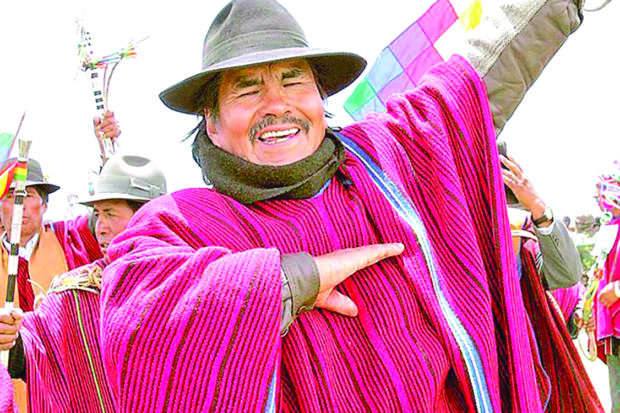
By Juan Trujillo Limones
As a result of cardiac arrest, the historic indigenous social leader Felipe Quispe Huanca died at the age of 78 on Jan. 19 in El Alto, Bolivia. The Mallku (community authority in Aymara), as he was also recognized, was an important leader who was planning to run for governor of La Paz in the March 7 election.
La Paz, with an estimated population of 940,000 inhabitants, is the third most populated city in the country. As a mirror of the political reality of Bolivia, Quispe’s legacy takes importance again in the face of society’s thirst for justice, which still bears the consequences of the Sacaba and Senkata massacres of November 2019. The controversial Supreme Decree 4078, signed in the days after the acts of violence, is seen as one of the current keys to demand justice and avoid impunity.
On Jan. 21, Quispe’s body was taken on a funeral walk through the indigenous city of El Alto, in the west of the country on Bolivia’s high plateau. El Mallku, who earned this name due to his intense leadership activity, was born in 1942 in the community of Chijilaya, Ajllata canton, in Achacachi, Omasuyos province, in the department of La Paz.
A controversial man for his radical political positions, he was the founder and a member of the Túpac Katari Indigenous Movement and the leader of the Trade Union Federation of Peasant Workers and the Central Obrera Departamental de La Paz.
Quispe’s thinking included armed struggle as a legitimate way for the people to defend themselves, which is why he founded and participated in the Túpac Katari Guerrilla Army. After 1983, he formed the political organization Ayllus Rojos. By 1998, after being released from the Chochocoro prison, he was the main leader of the Confederación Sindical Única de Trabajadores Campesinos de Bolivia.
After 2000, when the insurrectional cycle of popular protests returned to Bolivia, Quispe’s particular rebellion pushed him to participate with strong road blockades during the gas war, when the government insisted on privatizing and commercializing the resource, which ended in 2003 with the overthrow of the repressive president Gonzalo Sánchez de Lozada.
Possessor of a surprising rebel political culture inherited from his original Achacachi, where revolts and social movements have confronted the police and military power of authoritarian governments, his determination and rebellion originated in his deep awareness of the unequal conditions imposed by colonialism in the Bolivian highlands.
During his captivity, he graduated in history from the Universidad Mayor de San Andrés and taught at the Public University of El Alto. Now his legacy has been sown in the new generations of young activists and indigenous students—an Aymara pedagogy of popular struggle.
Under the government of Evo Morales (2006–2019), Quispe maintained a critical position, and after the imposition of the de facto government of Jeanine Añez, he articulated major mobilizations and blockades that demanded the holding of new national elections—which happened in August 2020. He made it clear that after the violent coup in 2019 and the horrific massacres in Sacaba and Senkata, the most effective way to achieve social justice is through popular mobilization.
The Sacaba and Senkata Massacres Remain Unpunished
The last flight of El Mallku in the highlands coincided with the end of a work cycle of the Interdisciplinary Group of Independent Experts (GEI), with the Inter-American Commission on Human Rights in Potosí, to collect the testimonies of victims and thus contribute to the clarification of the events after the coup.
Justice for the 36 dead and the hundred injured is still pending in the Andean nation. Created on Dec. 12, 2019, the GEI has made visits to the country’s regions since Sept. 1, 2020. It has had meetings with the Senkata Victims Association and will publish in May a partial report on the acts of violence in the departments of La Paz, Potosí, Cochabamba, Sucre and Santa Cruz.
For its part, the Bolivian Ombudsman’s Office published a report titled State Crisis: Violation of Human Rights in Bolivia, October–December 2020. The report highlights that the events in Sacaba and Senkata and the resulting deaths constitute “systematic murders,” where there was “excessive use of force, illegal detentions, violations of the right to life, personal integrity, liberty and equity,” which constitutes “crimes against humanity.”
Moreover, the deaths in La Paz, Cochabamba and Santa Cruz “constitute crimes against humanity” for being carried out “systematically against the civil population,” perpetrated by police officers and civilians wearing helmets.
The legacy and last breath of Quispe is condensed as a powerful stimulus to civil society and organizations to achieve much-needed justice for the Bolivian people.
One of the keys to understanding the stagnation in the application of justice comes directly from the Jeanine Áñez regime: Supreme Decree 4078, which was signed by her ministers, is a “unity pact” from November 2019 that gave carte blanche to the abuses perpetrated by the de facto government and removed the police and the army from criminal responsibility for their “pacification” tasks.
El Mallku’s struggle is another example of the hope for justice that comes from the exemplary history of struggle of the Aymara in Bolivia.
*****
Juan Trujillo Limones is a freelance journalist and anthropologist. Contact him at xaureme@protonmail.com
